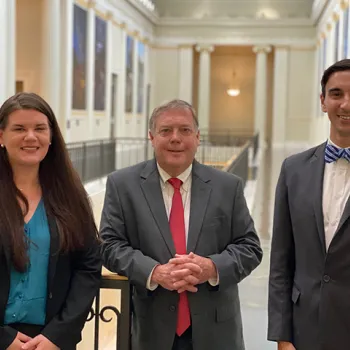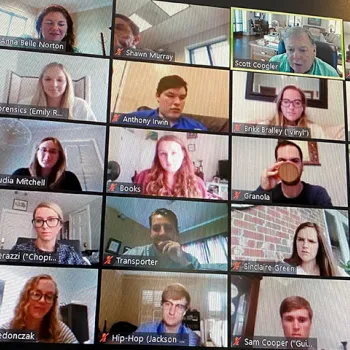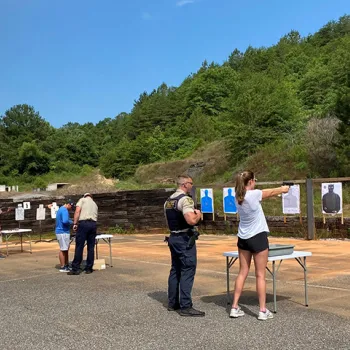For more than a decade, an annual summer intern program hosted by the Northern District of Alabama has given law students a vivid close-up view of the criminal and civil process.
This year, the highly hands-on program was jeopardized by wide shutdowns related to the coronavirus (COVID-19). But with imagination and persistence, more than 50 students will still get a memorable learning experience—most or all of it online.
“At any point in time, you can have your reality shifted,” said Chief Judge L. Scott Coogler. “The students are still really getting an experience. They are seeing how the law continues to operate, and how to act and continue as lawyers.”
Operating by computer hookup, this year’s program includes regular meetings with lawyers and criminal law experts, as well as in-depth opportunities to draft federal court orders and opinions, learn the ropes of working in chambers, and even perform acts of community service from afar.
As in other years, the vast majority of interns recently finished their first year of law school, a time when opportunities remain somewhat limited for aspiring lawyers, and most hail from the University of Alabama Law School. This year, additional students applied when their law firm internships were canceled by the pandemic. All told, more than 50 interns are taking part in two groups over the summer.
“I am very happy,” said Jesse Westerhouse, an intern. “We are getting to do some writing and research. It is a phenomenal experience.”
During a recent online meeting, Coogler provided guidance to his law clerks on the handling of various cases. He periodically paused to explain points of law to his new class of interns, their faces lined up in gallery style on a video screen.
“Who knows what a mutual company is?” Coogler asked. When no one answered, he explained that it is an insurance company in which policy owners also are part owners of the company. The practical significance is that more jurors need to be summoned in cases involving mutual companies, since their policy holders cannot be empaneled.
The program is popular at the University of Alabama, which like Coogler’s courthouse is in Tuscaloosa. One reason is that Coogler selects his law clerks from among former interns.
Atticus DeProspo, a former intern and now a graduate of the University of Alabama Law School, joined Coogler’s chambers in January, when Coogler became chief judge of the Northern District of Alabama. In addition to his other responsibilities, he was designated “cruise director” of this year’s intern class—a role that became vastly more challenging when the coronavirus threat escalated.
“I want the interns to have as good an experience as I had,” DeProspo said. “This is such an amazing opportunity for a first-year law student. Being an intern gave me a leg up when I became a law clerk. I’d already gotten a glimpse of how Judge runs his chambers, how to write an opinion from his perspective. I didn’t have to start from scratch.”
The program offers a wide range of experiences. Three days each week focus on legal experience, including at least one substantive writing project. Prior to the pandemic, one day a week was dedicated to field trips to law enforcement agencies and detention facilities. Even with the pandemic, the court scheduled an in-person visit, for students local to Tuscaloosa, to visit a firing range to learn about police firearms practices.
“I like to get them behind the curtain, so they can see what a federal court really does,” Coogler says. “Someday they’ll be handling cases, and they need to understand the law from all angles.”
While some in-person experiences have been put on hold, the online interns are getting regular presentations from lawyers and law enforcement officers. A recent “criminal day” began with a talk from Leslie Hines, an undercover policeman who once halted a mass shooting incident, followed by a prosecutor and defense lawyer.
A critical element is a day dedicated each week to service projects, such as working for Habitat for Humanity. This year, off-site interns are being asked to prepare food for first responders in their home communities.
“Judge always reminds us that it’s a privilege and honor to be a lawyer,” DeProspo said. “Whatever path you choose, it’s really important to give back.”
Virtual social gatherings also have been organized. “The judge and everyone have really worked to keep us connected,” said Maddie Sanders, an intern.
One of the most meaningful experiences will remain unaffected by the pandemic—the chance to work on real-life legal cases and to write first drafts of orders and opinions. Interns often start with cases filed by clients representing themselves or with Social Security appeals.
Laura Stephenson, a former intern and current law clerk for Coogler, said the experience of seeing her first draft become a part of a final decision had a lasting impact.
“It was so cool, especially only being a law student at the time,” Stephenson said. “But it was also humbling, to see that something I helped write will be part of the public record forever.”
Subscribe to News Updates
Subscribe to be notified when the news section is updated.



